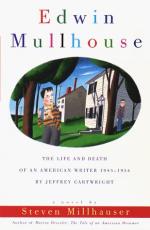|
This section contains 829 words (approx. 3 pages at 300 words per page) |

|
William Faulkner argued that the problems of children were not worth writing about. He wrote frequently about children himself, but he treated their lives as windows on the adult world, or as early parallels to mature venality, obsession, or tragedy. Similarly, he placed high value on [J. D. Salinger's] The Catcher In The Rye, mainly because the odyssey of Holden Caulfield was such an earnest and telling rebuke to contemporary morality….
[Portrait of a Romantic] is a rebuke to Faulkner's view of youth as trivial, for Millhauser successfully excavates childhood to reveal its hidden wonders and dismal dangers. His children are not paradigms of their own later existence, for they do not grow up; nor are they mirrors of the grownup world, which exists in the novel only insofar as it illuminates childhood.
His children—three boys and two girls in continuing crisis from ages six to fourteen...
|
This section contains 829 words (approx. 3 pages at 300 words per page) |

|


